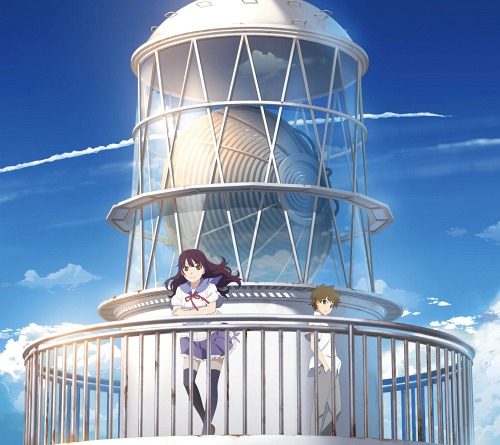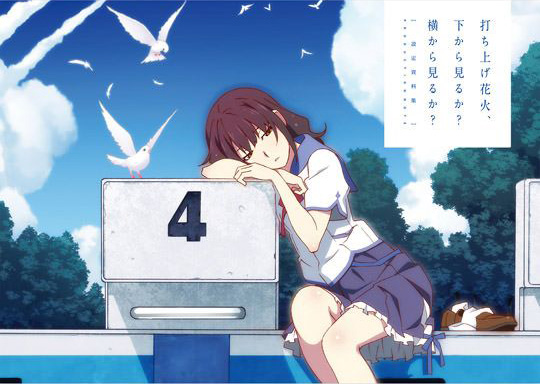
Studio Shaft’s movie, Uchiage Hanabi, Shita kara Miru ka? Yoko kara Miru ka?, shortened and localized as Hanabi (Fireworks), is a reimagining of a live action movie and TV show of the same name.
Hanabi’s anime adaptation is faithful to its predecessor, sharing similar shots, dialogue, and music cues. Shaft’s version, however, goes another step, adding new sections in the latter half and adding playful and exaggerated visuals, touching up a simple story with strokes of rose-tinted youth.
Hanabi’s story is fleeting, a beautiful memory, fragile like a piece of glass. What seems transparent—possibly empty—hides within it a charm when given the proper light. By understanding film language, Hanabi’s simple story becomes more than a fleeting memory. It stays with us like the brief moments of our childhood.
For this article, I’ll be taking a more direct approach. I’ll be analyzing certain scenes, working through them to show how Hanabi tells its story indirectly. By doing this, I can provide examples for how one can read a story through more than just words.
Subjectivity Molds the Setting: Moving from the Familiar into Fantasy
The movie starts off with a relatable scene, a brief look into the Norimichi’s family. As the scene transitions, our protagonist shifts gears and bikes to school. To carry these scenes, there is a natural momentum. The bikes sway the camera as if it were connected, shifting our gaze onto the small town—beautiful albeit unexciting.
Upon passing the ocean, time, the music, and movement slows. Through Norimichi’s eyes, we see someone framed in the spotlight, glistening like a light on the ocean waves. This is Nazuna Oikawa, the heroine constantly in the “spotlight.”
From this scene, the film establishes that it will play with perspective and subjectivity, the world literally changing to fit Norimichi’s perspective. This is one way a visual medium can tell a story: through the lens of a different person.
Fittingly, the movie accommodates its characters, changing the film’s animation and music as characters drift into their own world. When Nazuna recalls her mother’s favorite song, she sings its nostalgic melody.
The film then shifts outside Norimichi’s perspective and onto a new star, the camera in front of her as she walks towards it. She moves until she sees her reflection in the windows. Gasping, the lyrics stop, but the music continues. Guided by her own reflection, she takes its hand and steps into her own world. The music then swells, accompanied by more instruments than before.
Throughout the film, we’re given shots where Nazuna is “caged” by her environment: claustrophobic shots of her loneliness at school, her scenes with her parents dragging her away, and from the perspective of Norimichi’s eyes, her position in the center, constantly “caged” between obstacles.
However, in her own fantasy, what looks like a cage reveals itself to be a carriage as the camera zooms out. She leads Norimichi to a palace of glass, driven by horses. The music moves freely, supporting her unrealistic dreams. But the dream ends just as quickly as it starts. It cracks as the glass sphere in her hand drops.
She falls back into reality, finally admitting the truth, “I know it. We can’t run away or elope. But before I transfer to a new school… I wanted to be with you just this one day.
Before and Now: Unstated Feelings
Hanabi’s story exists within a single recurring day. As the day repeats, differences between the past and present emerge, creating context for how and why characters act.
After Norimichi loses a swimming race, Nazuna directs her attention to his best friend and winner, Yuusuke.
In a monotone voice, she asks Yuusuke out to the festival. When she sprays water on Yuusuke, her body language implies she’s annoyed. The apparent contrast of her voice and actions feels incongruous and insincere for a confession. Despite this, Yuusuke reads into her statement—finally, he gets his crush’s attention.
His jubilance extends into the next scene where we suddenly transition into a conversation about the shape of fireworks: are they round or flat? Yuusuke ignores this conversation, his thoughts preoccupied.
After time loops back and Norimichi wins, Nazuna’s expression and voice changes. Before Norimichi recognizes his victory, he’s hosed down with water. “Are you going to the fireworks tonight?” she asks. “Why?” he responds. “...Your house at 5, okay?” Nazuna says.
In this exchange, not only is her expression and intonation different, her giddiness extends to her dialogue, her excitement hastens the conversation before Norimichi even responds.
This time, when the conversation about fireworks occurs, Yuusuke responds promptly. The implication here is that his thoughts are no longer preoccupied—before he was thinking about Nazuna. After asking for Yuusuke’s opinion, they shift their attention to Norimichi.
His response breaks him out of his thoughts, and the camera shows his view of the class. Through his eyes, the world is distorted, as if through a looking glass. From this context, the viewer understands he’s in the same position as Yuusuke before. The difference now is Nazuna. He responds to the question about the fireworks in the same way he feels about Nazuna, “I dunno.”
Loss of a Moment: Living a Second Forever
“Are fireworks round or flat?”
At the half-way point, the movie has transitioned from reality into a flowery depiction of it, a rose-tinted version of youth.
Seconds after Nazuna exits her “glass fantasy,” Norimichi’s friends and Nazuna’s family chase after them. Reality has caught up, the film seems to say. To escape “reality,” Norimichi takes Nazuna’s hand and rushes to the lighthouse. Atop the building, the audience is presented with a familiar scene.
In the past, Norimichi was with his friends, watching fireworks exploding in a flat manner. This time, however, Norimichi is with Nazuna, witnessing fireworks explode like 3d flowers. From here, they share a moment, but before that moment is realized, Yuusuke scares them, and the budding couple falls into the ocean.
Time resets, and this time we’re once again on the train. This time, the perspective is from Norimichi, watching Nazuna from behind. With it, we see no fantasy, no glass palace, no horses to lead them away. Norimichi’s dead eyes say it all.
“You were there for me so I was able to keep on living,” Nazuna sings. Norimichi’s eyes focus. He snaps out of his reverie as sounds of the train echo. He dashes towards Nazuna and tackles her to the floor—this way, neither her parents nor his friends can see her.
Instead of letting reality sink in, Norimichi chooses to preserve this one day. The train takes a distinctly different path, marked visually by the tracks changing. It leads them on a path unlike before. Between the ocean water, the train heads towards a new destination.
At their final stop, they emerge into a new world. Encased by glass like a snowglobe, the walls of this world connect to transparent cities. This world is devoid of anyone—except for the two of them. They are lonely, but together, they can share this moment… but for how long?
“If I threw the ball, wishing the world would go back to the way it was, would it? Norimichi ponders. “It probably would,” she responds. Norimichi grasps at his chest, a pained expression falls upon his face. “Then you’d… you’d move away. Then we won’t be able to… I don’t want that. I’d rather stay in this strange world and be with you!”
Norimichi confesses his true feelings. However, Nazuna looks pained. Based on past information—how she knows that this moment cannot last—the implication here is she cannot answer his feelings. Instead of responding directly to his confession, she breaks away from the topic.
Her response to his confession is unstated, but clearer than any words can provide. She invites him to the very place they first met—the ocean.
Final Thoughts

Hanabi is a beautiful film, mesmerizing with its visuals and supportive musical score. The film captures the fleeting nature of youth through the lens of an unrealistic moment, repeating it, wishing to never let go. Whether fireworks are round or flat depends on perspective, and once the light hits the glass, you too might see the beauty of a fleeting, ephemeral youth.

